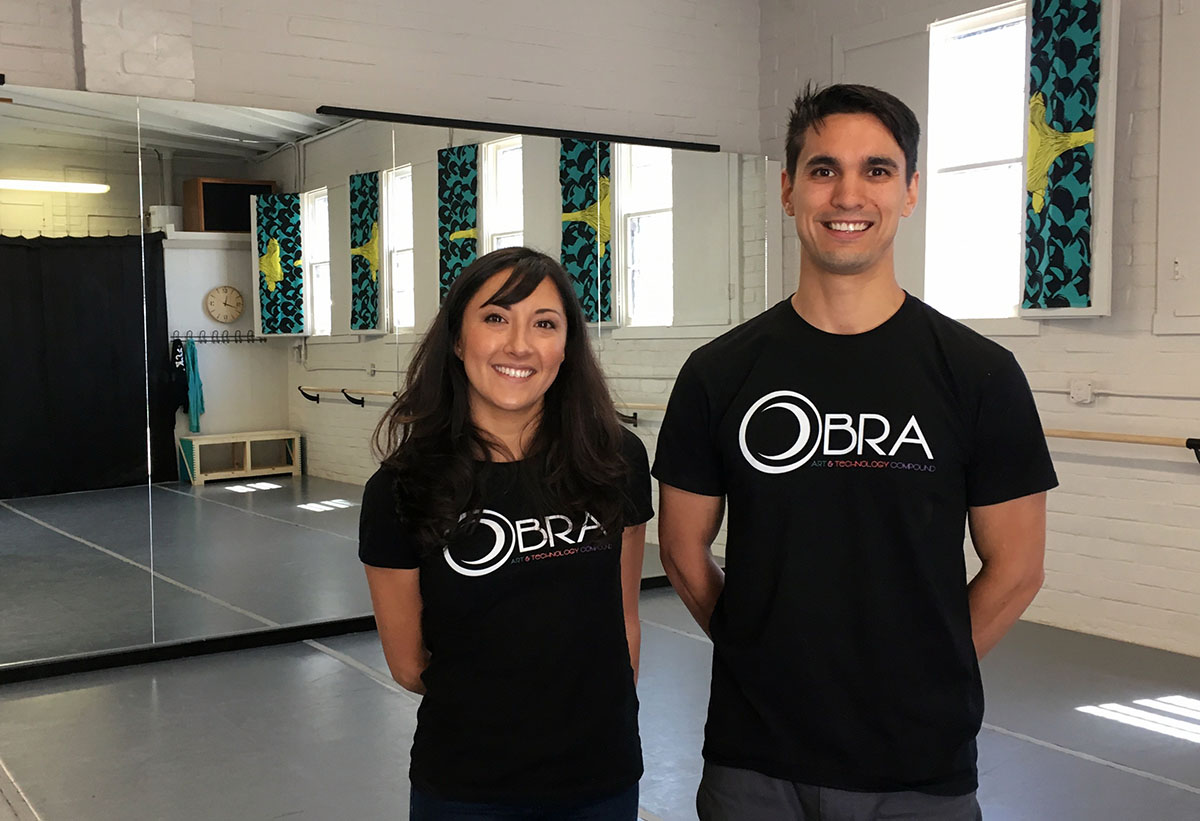Step into Obra, a new company located in a warehouse just north of midtown Sacramento, and it’s quickly apparent you’re seeing something different. Workbenches and giant wood cutting tables sit next to a room full of computers and soldering irons. Beyond that, there’s a dance floor – built in-house – complete with mirrors and a barre.
Obra, founded by Sacramento State alumni Isela Perez ’12 (Journalism) and Brandon Ortiz ’15 (Computer Engineering), opened its doors in January and probably is best described through its name: The word means “work of art” in Spanish, and the warehouse is part maker’s space, part dance studio. The company is founded on the belief that through combining their talents – Perez is a dancer who studied journalism, Ortiz studied computer engineering and has a background in product design and development – they can create, and help others create, something stronger and more meaningful.
“We realized how much art has an impact on creativity,” Ortiz says. “Even if it’s programming, where you can get into this mindset of just grinding and doing strictly technical work, if you step back and think about the artistic or creative aspect of what you’re doing, you tend to find better solutions to the problem.”
Perez and Ortiz met three years ago at a sports bar in Sacramento, and even from their initial conversations knew they had a lot in common, including a desire to create something new and unique. They just didn’t know specifically what that was yet.
Both transferred to Sacramento State from community college – Perez transferred from Sacramento City College, Ortiz attended Sierra College in Rocklin before working to design control systems for an elevator company – and says both the perspective of being older than the traditional student as well as the accessibility of their professors helped them get the most out of their time on campus.
“We valued education a lot and I think that’s what motivated us to get close with our professors, to be able to talk with them,” Perez says. “You realize, ‘I could have been doing this with high school, I could have been really connecting with professors, with my peers, and taking advantage of more. Sac State was definitely welcoming for someone who wanted to go as far as they could.”
In 2015, a six-month trip to Nicaragua where, Ortiz says, “we just had each other,” taught them both how to respond to new challenges and live a minimalist life. “We found happiness from creating. We wanted to build a place where we can create and use our skills and the experience we picked up to help other people create.”
Obra’s revenue comes through dance classes Perez offers at the studio – she also works part time as a dancer for the Sacramento Kings – as well as various other projects and partnerships, such as creating stencils for a group that wanted to use street art to promote this year’s Sacramento Concerts in the Park lineup. The company also is set up to sell the products that are made in its work space. Its current partners include the maker of a large LED chandelier that can be used as an art display or centerpiece at special events, as well as Sacramento State’s own Hornet Hyperloop team, for which they are helping to develop control systems.
The art and the tech go hand-in-hand: Ortiz began dancing about a year ago, giving him a creative outlet when he needs a break from product development. Perez says the same about learning to program. They encourage their partners to utilize the dance space – even a couple of the Hyperloop team members have started to wander over to the studio side of the warehouse.
“It’s a group of engineering students, probably not the most likely to jump out on the dance floor, but we’ve got some of them moving,” Ortiz says.
The couple spend 12-14 hours a day in the studio, seven days a week. But they say the ability to spend each day creating something new continues to motivate them, as well as the belief that they have built something that isn’t just unique, but necessary.
“I think (something like Obra) was missing,” Perez says. “A place that you can create without a boundary. I don’t think there’s ever an idea that we’ll say, ‘No, we’re not going to do that,’ or, ‘No, we don’t know about that.’ Bring us your idea, and we’ll try our best to make it happen.”


